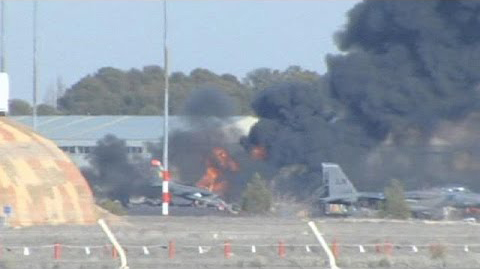
IT WAS going to be just another routine exercise, one of many that take place at the Los Llanos military base in Albacete, southeast Spain, as part of a NATO flight training program.
But at 3.16pm on Monday, an F-16 fighter jet manned by two Greek pilots crashed on takeoff, hitting the hangar where other aircraft were awaiting their turn to take part in the course.
The collision produced a massive ball of fire that successive teams of firefighters took an hour to put out, while a dense plume of black smoke rose into the air.
Ten military personnel died on impact: the two Greek captains and eight Frenchmen – three captains, one lieutenant and four non-commissioned officers.
Another 21 people were wounded, seven critically. Five of them were transferred to the burns unit at La Paz hospital in Madrid, around 250 kilometers away, where one of them – of French nationality – died on Tuesday morning, bringing the death toll to 11.
The Los Llanos crash is the worst accident sustained by NATO in recent years outside conflict areas, both in terms of casualty count and affected member states.
Several Spanish officials visited the crash site on Monday, including the regional premier of Castilla-La Mancha, María Dolores de Cospedal, and General Francisco Javier Arnáiz, Chief of Staff of the Spanish Air Force, who brought along a group of experts from the Military Aircraft Accident Technical Investigation Committee (CITAAM).
Spanish Defense Minister Pedro Morenés also paid a visit and stressed the routine nature of the training course.
“This is a NATO operation that is constantly repeated to rehearse joint operations. We lament the tragedy. I am sorry for the victims and their relatives,” he said, adding that Spain had already expressed its condolences to other affected countries.
Spanish Prime Minister Mariano Rajoy told television network Telecinco that the French and Italian defense ministers would travel to Spain on Tuesday to examine the crash site in person and talk to military personnel there.
Morenés, however, said the Italian minister’s trip was not confirmed and that he had been unable to contact his Greek counterpart.
The investigation into the crash has been placed under seal by a Valencia military court. But preliminary evidence suggests that the aircraft’s only engine failed, for reasons that remain unclear, making the jet lose power during takeoff.
The F-16 collided into other NATO planes awaiting their turn to take off. Their fuel tanks were full, and some had already started their engines. There was a considerable number of pilots and mechanics in the area.
The collision affected at least five other airplanes, French Mirages and Italian Alfa Jets. The two Spanish Eurofighters were outside the parking area at the time, which saved them.
The difficulty of the rescue operation was compounded by the fact that the aircraft carry explosives to eject the seats, increasing the risk of new blasts. The F-16 flies on a highly toxic type of fuel, which forced emergency crews to adopt additional precautions.
The incident took place during the course of NATO’s Tactical Leadership Programme (TLP), based in Los Llanos. The airbase serves as an international training center for NATO pilots and crews, who take daytime and nighttime flying courses there. Ten member states make up the TLP (Spain, Germany, Belgium, Denmark, France, United States, Greece, the Netherlands, Italy and Britain), although other countries also occasionally participate.
The TLP center was set up in Albacete in 2006, after a decision was made to transfer it from Belgium. No other accidents have been reported since then.
The flying course that the Greek F-16 was taking part in began on January 19 and was scheduled to end on February 13. A total of 750 military personnel were participating, including pilots and ground crews.
“This is a tragedy which affects the whole NATO family. I express my heartfelt condolences to the loved ones and the nations of those who lost their lives, and I wish a speedy recovery to the injured,” said NATO Secretary General Jens Stoltenberg in a statement.
Elpais.com








